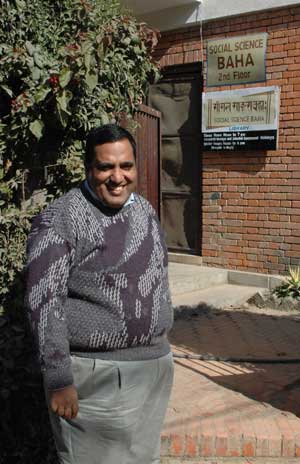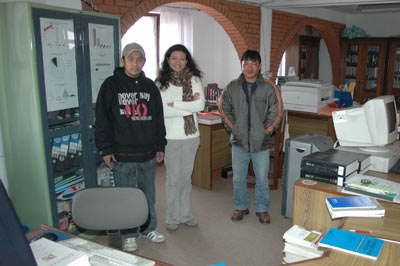SWEDISH SOUTH ASIAN STUDIES NETWORK
Visit to Social Science Baha, Kathmandu, Thursday 1 December 2005
 Web
page: www.himalassociation.org/baha
Web
page: www.himalassociation.org/baha
Mr. Hari Sharma is the Director of the Social Science Baha, a meeting place for social scientists in Kathmandu and Nepal, located in the residential area of Patan Dhoka, Lalitpur. He is trained in political science, but has the ambition with likeminded persons to bring together the social sciences and make it relevant to Nepalese society today. Mr. Sharma has worked as a principal secretary to the Prime Minister in periods from 1991 but now teaches part time at the Kathmandu College of Management under the private Kathmandu University.
Baha builds on voluntary efforts. In 1999 they received a grant from
Ford Foundation to start a library and a meeting place to this effect.
Today they have their own building, a well equipped library and a yearly
four-month Immersion Course on contemporary social issues, a kind of state
of the art of the social sciences. The intake is 26 from about 75 applicants.
The fee is Rs. 10 000 and teachers are paid a low remuneration as they
already have regularly jobs elsewhere. A faculty of ten researchers make
up the core of these teachers. The word 'Baha' comes from the Newari term
for 'Bihar', the traditional monastic centre of learning of Kathmandu
Valley. More
information on the 2006 Immersion Course on contemporary social issues.
The course is much sought after not only among students in the social
sciences but also in the natural sciences who feel the need to place their
work in a social context. The course is divided into modules like research
methodology, politics and society, globalisation and society, etc.
 Administrative support
is provided by Himal Association, the 14-year
old non-profit Nepali organisation involved in all aspects of knowledge
and information dissemination. Since 1997 is has for example been responsible
for the festivals of South Asian documentaries, Film South Asia. More
information on the documentary film festivals.
Administrative support
is provided by Himal Association, the 14-year
old non-profit Nepali organisation involved in all aspects of knowledge
and information dissemination. Since 1997 is has for example been responsible
for the festivals of South Asian documentaries, Film South Asia. More
information on the documentary film festivals.
A small staff handles the library and the administration (members
of the staff on the photo to the left). During our meeting in the
office building in Lalitpur we also met the Programme manager, Mr. Ajaya
N. Mali, responsible for the society’s web site.
Baha organises guest lectures, seminars and conferences. Foreign scholars
on Nepal and the Himalaya region are also invited to speak when they visit
the country.
The conferences have attracted scholars worldwide. So far they have organised
three:
• The Agenda of Transformation: Inclusion in Nepali Democracy (2003)
• Nepal Tarai: Context and Possibilities (March 2005)
• Negotiating ethnicity in Nepal's past and present (September 2005, in collaboration with CNAS (Centre for Nepal and Asian Studies), Tribhuvan University, and University of Bielefeld, Germany)
Hari Sharma is doing research on social movements, and he and Baha have a vast network with social scientists in South Asia, especially with India, Nepal’s other ‘self’. In India Social Science Baha is for example, linked with the Centre for Developing Societies in New Delhi and in Pakistan with the Sustainable Development Policy Institute in Islamabad.
‘Is Nepal then sitting on a ‘ticking bomb’, we ask.
Hari Sharma’s answer is interesting:
”No. This is not so. But the Maoists through their ‘violence’ have created a strong radical challenge to the Nepalese society, which has to be addressed. The key question today is not how to deal with the Maoists but how to deal with the issues that have come to the fore.
We need a peaceful dialogue, involving also the Maoists, about a politics of engagement instead of a politics of displacement. That is our only chance.
Nepal is also not Afghanistan, ‘sandwiched’ as it is between India and China closely watching what is going on here.”
‘This is where Baha comes in,’ Sharma says.
”Nepal is in a rapid state of transition into capitalism and modernity and belongs to the third generation of democratisation with a strong mobilisation from below. We bring in comparative studies and the global context.”
SASNET - Swedish South Asian Studies Network/Lund University
Address: Scheelevägen 15 D, SE-223 70 Lund, Sweden
Phone: +46 46 222 73 40
Webmaster: Lars Eklund
Last updated 2006-02-13
